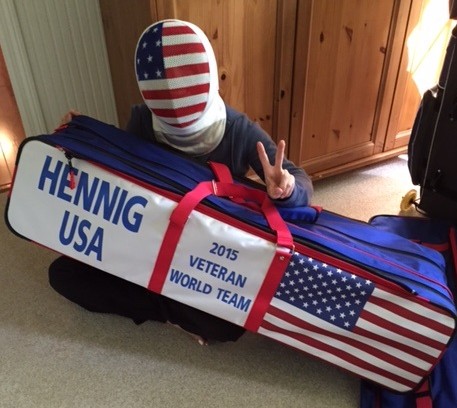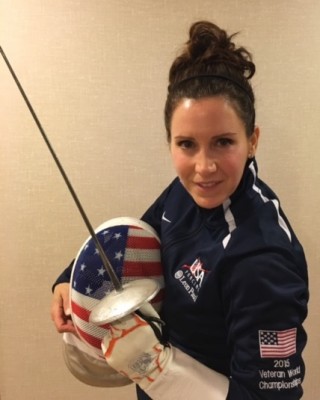Bonnie Hennig is packing her bags for Paris, not to represent UConn Health at a conference, but to represent the United States at the 2015 Veterans Fencing World Championships.

Hennig, the associate director of UConn Health’s Huntington’s Disease Program, shares the No. 2 ranking in the U.S. in her category, which is women age 50 to 59 who compete with a sword called a foil.
“To me it’s the ultimate sport,” Hennig says. “Fencing is considered ‘physical chess.’ It’s aerobic with an anaerobic piece to it. It’s one of those sports that has team comradery but is also very individual.”
Hennig first dabbled in fencing in college but hadn’t picked up a foil for two decades when a local club opened 10 years ago and she got back into it. Recreational fencing became competitive fencing, locally, then regionally, then in national tournaments.
“This is the first time I’ve met the age requirement for an international veteran tournament. For international competition, you’re not considered a ‘veteran’ until age 50,” Hennig says. “For a veteran fencer, the World Veteran Fencing Championship is the highest level you can reach.”
The world championship events take place in Limoges, France, Oct. 20-25.

“While I would love to be a world champion, my first goal is to enjoy the journey,” Hennig says. “It’s not just about a medal around my neck. If I can go to France and fence my best, then I’ve met my goal. I want to fence ‘in the zone’—I’ve been there before and it’s an awesome place. My first plan is to arrive at the venue, do a 360 degree turn, take it all in, and say, ‘I am here!’”
Hennig trains at the Connecticut Fencers Club in Middletown twice a week. She also competes on weekends.
“What’s great about this sport is that anyone can fence,” Hennig says. “There is a lot of technique to it, but people can do it recreationally or competitively. You can go anywhere in the world to fence. It really brings people together.”
In her case, it helped bring husband and wife together. Hennig and Dr. Robert Trestman, executive director of Correctional Managed Health Care and interim director of the Center for Public Health and Health Policy at UConn Health, have fencing in common. While they initially met at UConn years ago, it was fencing that brought them together. They were reintroduced through fencing in 2010 and married in 2012.